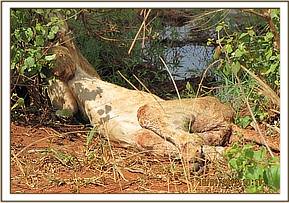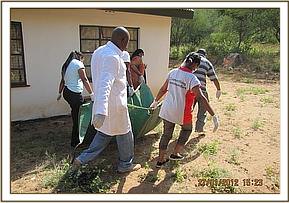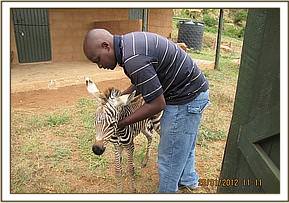Introduction Having closed for the December holidays, the Tsavo veterinary unit started the year with minimal challenges due partly to favorable environmental factors
Introduction Having closed for the December holidays, the Tsavo veterinary unit started the year with minimal challenges due partly to favorable environmental factors. Nutrition and water availability in the region remained fairly good and no deaths were reported that were caused by starvation. Cases handled in the unit included treatment of a rescued zebra foal and a lioness with hind limb paralysis. The month of February is expected to record increased case load due to expected effects of drought.
Rescue and treatment of a lioness with hind limb paralysis in Tsavo East Pipeline area, 18th January. The injured lioness was spotted by tourists trying to quench its thirst near a burst Mzima water pipeline near the Park headquarters. The lioness was immobilized using a mixture of 300 mgs of Ketamine Hcl and 3mgs meditomidine. Examination revealed lumbosacral spinal paralysis that lead to dragging of both hind limbs. She was transferred to a temporary crate near Tsavo research centre where close monitoring and rehabilitation was attempted for a week with little success. Despite adequate feeding, passage of feces or urine was not observed making the case more complicated.



Treatment of a rescued zebra foal at Voi elephant stockades, 25th January. The zebra foal was rescued from Maasai wildlife conservation Trusts Kuku ranch conservancy after being found wondering alone. Several attempts were made to return her to the area of rescue for reunion with the mother in vain. She was brought to Voi and examination revealed severe dehydration, poor body condition and pneumonia attack.


Conclusion and acknowledgments The coming months case load within the region is expected to increase due to the high temperatures being experienced in the region that often leads to drying up of temporary watering points and forage depletion. The unit acknowledges the support of its sponsors ViER PFOTEN through The David Sheldrick Trust for their continued funding of the unit and not forgetting The Kenya Wildlife Service for hosting the unit and provision of other logistical support.
Report by: Dr. Jeremiah Poghon
The Mobile Veterinary Unit operated by The David Sheldrick Wildlife Trust working with The Kenyan Wildlife Service and funded by Vier Pfoten.